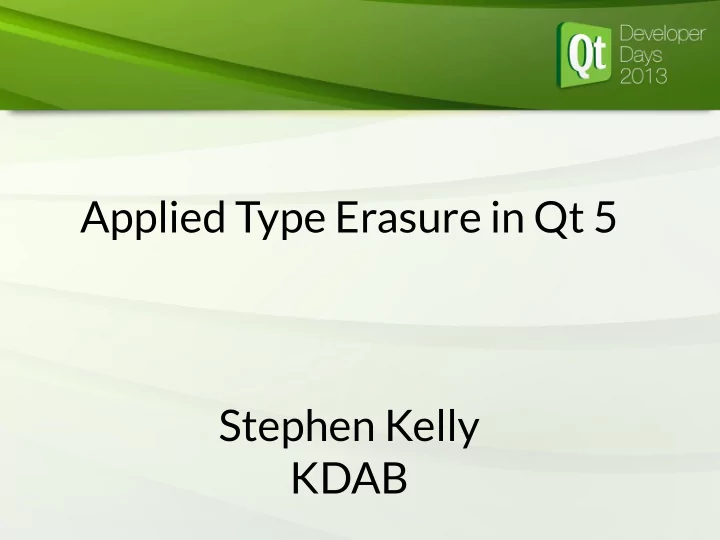

Applied Type Erasure in Qt 5 Stephen Kelly KDAB
Stephen Kelly ● KDAB engineer ● Qt Maintainer (ItemViews, CMake) ● KDE Developer ● Many Qt contributions – QVariant – QMetaType ● Grantlee - domain specific language ● Boost developer ● CMake developer
Type Erasure “Process of turning a wide variety of types with a common interface into one type with that same interface.”
Type Erasure ● Hold distinct, unrelated types ● Convert between types ● Store instances in containers ● Copy instances ● Assign instances
Type Erasure ● Interface abstraction ● Interface abstraction – QVariant QAbstractItemModel::data(); – QVariant QAbstractItemModel::data(); – QVariant QVariantAnimation::valueChanged() – QVariant QVariantAnimation::valueChanged() ● Domain Specific Language ● Domain Specific Language – QML – QML – Grantlee – Grantlee ● Language binding ● Language binding – PyQt/PySide – PyQt/PySide – RubyQt – RubyQt
Domain Specific Language import QtQuick 2.0 Rectangle { color : “lightsteelblue” width : 42 height : 47 }
Domain Specific Language Rectangle { color : “red” color : Qt.rgb(255, 0, 0) color : Qt.red }
Text Template System <html> <p>Welcome back {{ user.name }}! <p>You have {{ user.messages.length }} messages {% for message in user.messages %} <li>From: {{ message.sender }} : {{ message.content }} {% if message.urgent %} <img src=”urgent.png”/> {% endif %} {% endfor %} </html>
Text Template System <html> <p>Welcome back {{ user.name }} ! <p>You have {{ user.messages.length }} messages {% for message in user.messages %} <li>From: {{ message.sender }} : {{ message.content }} {% if message.urgent %} <img src=”urgent.png”/> {% endif %} {% endfor %} </html>
Requirements ● Type conversion – String, numbers – Equivalent colors – {% if message.urgent %} ● Properties – {{ user.name }} – {{ messages.length }} ● Containers – Sequences – Mappings – {% for item in container %}...{% endfor %}
QVariant
QVariant
Conversion I ● QString QVariant::toString() – QVariant(42).toString() – QVariant(3.15).toString() – QVariant(“Hello, world!”).toString() ● bool QVariant::toBool() – QVariant(42).toBool() – QVariant(true).toBool()
Properties class User : public QObject { Q_PROPERTY(QString name ...) Q_PROPERTY(int numMessages ...) Q_OBJECT // ... }; QObject* obj = new User(this); obj->property(“name”).toString(); obj->property(“numMessages”).toInt();
Text Template System <html> <p>Welcome back {{ user.name }} ! <p>You have {{ user.messages.length } } messages {% for message in user.messages %} <li>From: {{ message.sender }} : {{ message.content }} {% if message.urgent %} <img src=”urgent.png”/> {% endif %} {% endfor %} </html>
Conversion II ● QObject* QVariant::value<QObject*>() – QVariant::fromValue(new QObject) – QVariant::fromValue(new QFile) – QVariant::fromValue(new User) – QVariant::fromValue(QPointer<User>) – QVariant::fromValue(QSharedPointer<User>) – QVariant::fromValue(QWeakPointer<User>)
Conversion II class User : public QObject { Q_OBJECT // ... }; auto sp = QSharedPointer<User>::Create(); QVariant var = QVariant::fromValue(sp); // Later: QObject *obj = var.value<QObject*>() QString propValue = obj->property(“some_prop”).toString();
Text Template System <html> <p>Welcome back {{ user .name }}! <p>You have {{ user .messages.length }} messages {% for message in user.messages %} <li>From: {{ message .sender }} : {{ message .content }} {% if message .urgent %} <img src=”urgent.png”/> {% endif %} {% endfor %} </html>
Sequential Containers class Message : public QObject { Q_OBJECT QPROPERTY(QString content ...) QPROPERTY(QString sender ...) }; class User : public QObject { Q_OBJECT Q_PROPERTY(QList<Message*> messages ...) };
Sequential Containers QObject *userObject = ...; QVariant var = userObject->property(“messages”); // Can't do this: QList<Message*> list = var.value<QList<Message*> >(); // Can't do this: QList<QObject*> list = var.value<QList<QObject*> >(); // Can do this (Qt 5.2)! QVariantList list = var.value<QVariantList>();
Sequential Containers if (var.canConvert<QVariantList>()) { auto iter = var.value<QSequentialIterable>(); foreach(const QVariant &item, iter) { // item.toString(); // item.value<QObject*>(); } }
Sequential Containers if (var.canConvert<QVariantList>()) { auto iter = var.value<QSequentialIterable>(); for (auto it = iter.begin(); it != iter.end(); ++it) { // it->toString(); // it->value<QObject*>(); } }
Sequential Containers if (var.canConvert<QVariantList>()) { auto iter = var.value<QSequentialIterable>(); for (QVariant item : iter) { // item.toString(); // item.value<QObject*>(); } }
Sequential Containers ● Built-in support for: – QList – QVector – QStack – QQueue – QSet – QLinkedList – std::vector – std::list
Associative Containers QObject *userObject = ...; QVariant var = userObject->property(“some_mapping”); // Can't do this: QHash<QString, Message*> mapping = var.value<QHash<QString, Message*> >(); // Can't do this: QHash<QString, QObject*> mapping = var.value<QHash<QString, QObject*> >(); // Can do this (Qt 5.2)! QVariantHash mapping = var.value<QVariantHash>();
Associative Containers if (var.canConvert<QVariantHash>()) { auto iter = var.value<QAssociativeIterable>(); for (auto it = iter.begin(); it != iter.end(); ++it) { // it.key().toString(); // it.value().toString(); } }
Associative Containers ● Built-in support for: – QHash – QMap – std::map
Associative Containers if (var.canConvert<QVariantPair>()) { auto pair = var.value<QVariantPair>(); // pair.first().toString(); // pair.second().toString(); } ● Built-in support for: – QPair<T, U> – std::pair<T, U>
Text Template System <html> <p>Welcome back {{ user.name }}! <p>You have {{ user.messages.length }} messages {% for message in user.messages %} <li>From: {{ message .sender }} : {{ message .content }} {% if message.urgent %} <img src=”urgent.png”/> {% endif %} {% endfor % } </html>
Conversion III Q_DECLARE_SMART_POINTER_METATYPE(std::shared_ptr) Q_DECLARE_SEQUENTIAL_CONTAINER_METATYPE( std::deque) Q_DECLARE_ASSOCIATIVE_CONTAINER_METATYPE( std::unordered_map)
Conversion IV struct Roles { QString toString() const; }; QMetaType::registerConverter(&Roles::toString); QMetaType::registerConverter(converterFunction); QMetaType::registerConverter(converterFunctor);
Conversion IV #include <QDebug> struct Roles { bool canDelete() const; bool canCreate() const; bool canAccess() const; QString toString() const { return “Roles”; } }; Q_DECLARE_METATYPE(Roles) int main(int argc, char **argv) { Roles r; QMetaType::registerConverter(& Roles::toString ); QVariant v = QVariant::fromValue(r); qDebug() << v.toString(); }
Summary ● Type erasure based on QVariant ● Qt 5.2 new capabilities – Generic QObject* handling – Generic smart pointer handling – Generic container iteration – User extensible – User-defined conversions
Q & A stephen.kelly@kdab.com
Recommend
More recommend